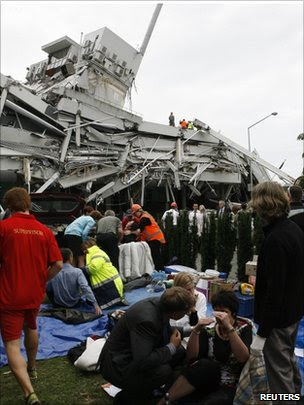22 February 2011 Last updated at 04:03 GMT Brendan Burns, MP for Christchurch Central: "The situation is pretty desperate"
Multiple fatalities have been reported after a powerful 6.3-magnitude earthquake struck Christchurch on New Zealand's South Island, police say.
The tremor, which hit at 1251 (2351 GMT on Monday) only 10km (6.2 miles) south-east of the city at a depth of 5km (3.1 miles), caused widespread destruction.
The fire service said numerous people were trapped in buildings, and a state of emergency has been declared.
The damage is said to be far worse than after September's 7.1-magnitude quake.
Two people were seriously injured by the tremor, whose epicentre was further away and deeper. It caused an estimated $3bn in damage.
There have been several aftershocks since last September's quake, with a 4.9 magnitude tremor hitting just after Christmas.
'Very black day'  The Pyne Gould Guinness building in central Christchurch suffered severe damage
The Pyne Gould Guinness building in central Christchurch suffered severe damage TV pictures of the aftermath of Tuesday's earthquake showed several collapsed buildings in the centre of Christchurch.
People could be seen wandering the rubble-filled streets in distress.
Local police said there were reports of multiple fatalities, including that two buses had been crushed by falling buildings.
There were also reports of fires and of numerous people being trapped in collapsed buildings, they added. Witnesses said up to 150 people were feared trapped inside the Pyne Gould Guinness building alone.
Local television showed bodies being pulled out of rubble strewn around the city centre. It was not known if they were alive.
Christchurch Cathedral, an iconic stone building in the centre of the city, was partly destroyed, its spire toppling into the square below.
"I was in the square right outside the cathedral - the whole front has fallen down and there were people running from there - there were people inside as well," John Gurr, a camera technician, told the Reuters news agency. "Colombo Street, the main street, is just a mess."
Radio New Zealand reported that its staff had to cling to their desks during the tremor, and that a church near its offices had collapsed.
Concrete in Victoria Square had risen at least a metre in some places and there are signs of liquefaction around the Avon river, RNZ added.
Continue reading the main story "When the shaking had stopped I looked out of the window, which gives a great view onto Christchurch, and there was just dust"
Power and telephone lines were knocked out, and pipes burst, flooding the streets with water.
There is also a shortage of ambulances, so private vehicles are being used to ferry the injured to triage centres. Initial reports said the main hospital had been evacuated, but this was later denied by the police.
Christchurch Mayor Bob Parker said he was on the top floor of the city council building when the quake hit, throwing him across the room.
"I got down onto the street and there were scenes of great confusion, a lot of very upset people," he said. "What I can see from where I am in the central city is that there are significant amounts of additional damage."
"Make no mistake - this is going to be a very black day for this shaken city," he added.
Christopher Stent said Christchurch's roads were gridlocked with people trying to flee the city as the authorities have instructed.
"The whole house shook... it looks a bit like a bombsite," he told the BBC. "My whole body felt like it was out of control."
Prime Minister John Key told parliament that the reports from Christchurch had spoken of "significant damage".
"The worrying fear, of course, is that this earthquake has taken place at a time when people were going about their business - it is a very populated time, with people at work, children at school. Sadly, I cannot rule out that there have been fatalities."
Mr Key is due to arrive in Christchurch shortly.
The military was later called in by the government to assist the rescue effort.
National Civil Defence Controller David Coetzee said "significant" aftershocks should now be expected.
New Zealand lies at the southern end of the so-called Pacific Ring of Fire, and above an area of the Earth's crust where the Pacific Plate converges with the Indo-Australian Plate.
The country experiences more than 14,000 earthquakes a year, of which only around 20 have a magnitude in excess of 5.0.
The last fatal earthquake was in 1968, when a 7.1-magnitude tremor killed three people on the South Island's western coast.